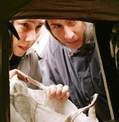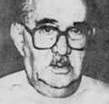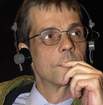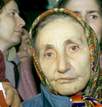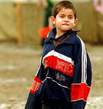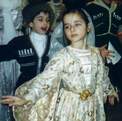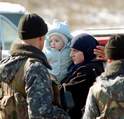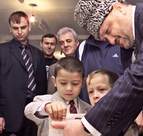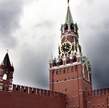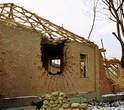 |
On October 8 the Moscow-based Institute for Development of Press hosted a presentation of the book "People live here. Chechnya: the chronicle of violence" (the authors-compilers U. Baissayev, D. Grushkin), the first published volume of which covers the statistics of violent crimes in war-torn Chechnya from July through December 2000. The authors of the book who collected and generalized the chronicle of crimes took part in the press conference: Usam Baissayev and Dmitry Grushkin, Oleg Orlov and Luisa Mussayeva, employees of the Russian and the Chechen Memorial human rights center, Viktor Shenderovich, a man of letter, Grigory Yavlinsky, a deputy and a candidate for deputy of the Russian State Duma, the leader of Yabloko Party.
Who lives here?
The presented book is a chronicle of murders, rapes, robberies, plundering, explosions, beatings, disappearances, abductions, arsons, destruction, bombardments in figures and accounts of eyewitnesses consecutively documented and placed in chronological order by dates, weeks, months. All these accounts were collected by a group of the Memorial human rights center working in Chechnya at the moment. One can begin reading the book from any page, fortunately, it contains no pictures. The book opens with a foreword by Sergei Kovalev, a deputy of the Russian State Duma, and it ends in an afterword by the writer Viktor Shenderovich. A quote from the speech of President Vladimir Putin in Brussels is used an epigraph to the book. Here is only a part of it:
"You are talking about human rights violations. Whose rights? Can you specify - names, addresses, last names!"
The terrible book-exposure contains all that. However, most people in whose addresses our President became interested did not survive. Some of them, those who were not identified - have no names and last names. They were united by the fact that they lived in a place which official mass media stopped calling "the zone of an armed conflict" long ago, and human rights activists, who collect information, call the Zone. They say they are working in the Zone.
They say their job has turned more difficult. And probably, in the wake of the presidential election in Chechnya, it will become even much more difficult. Memorial's groups abandoned the idea of pre-election monitoring fearing to endanger people who share information. Memorial is the only large human rights organizations having its offices not only on the territory of Ingushetia but also in Chechnya.
Dmitry Grushkin, Usam Baissayev: "What is going on today in Chechnya? On the table in front of us - information about recent abductions and murders. The statistics picture has not changed as compared to last year... 2002 was the heaviest. Today's period is characterized by growing atrocities and violence regarding women and the spillover of the conflict to neighboring Ingushetia. another feature: "address operations" replaced large-scale zachistki. It sounds more pleasing - as if criminals are being tracked down, and the level of violence is higher and more terrible. It is useless to find culprits, to try to find out address of military units..."
"How do we collect information? It was easier during the first war. We visited settlements where certain events... took place, and we talked to people: as many people as we needed to make information reliable. A week, a month. We cannot work like this during this war: it is impossible to cover everything. We manage only to ask quickly questions with the help of volunteers to document events, and may be, to come back later...
We document all cases of rape and all victims, regardless of subjects of rape. As for military casualties - it is much more complex: after an explosion, for example, we are not allowed to approach the scene. But everything we find out is placed on the chronicle. It is difficult to count casualties among the civilian population: in any case relatives of the dead are most likely to say they were civilians.
We decided to publish a new volume once in six months. Checking and generalizing information. The next volume will come out in spring... and it will be much more terrible than this one."
... Information is being collected not only for the book. Memorial tries to find those who are guilty of arbitrariness, those who disappear.
Oleg Orlov: "The best method to check our data - is to get a confirmation from the prosecutor's office. We send inquiries, keep up volumes of correspondence, on each fact we manage to discover. Usually the prosecutor's office reply in the following way: "the event did not take place," or "facts are presented incorrectly." But we keep up our correspondence persisting: "where did you get the information?" Often it turns out that we are right. The prosecutor's office has to admit that people were killed or abducted. Does that mean that the abductees will be saved?.. No. Unfortunately..."
Oleg Orlov sadly noted that only in isolated cases from dozens federal soldiers were really convicted for criminal crimes. Most instigated proceedings are dropped because it is impossible to identify culprits. Of course, there are convictions. For what crimes? It is easy to recall them: the cases are few. A barbaric murder of a family in Khankala. A road accident... common for Chechnya: a smashed car. Two women died. Viktor Shenderovich sadly looked around: "German TV? Radio Liberty?" Where is the first channel, second? third? fourth?... As usual. If people read the book... That would have been a demonstration larger that the 500,000 strong demonstration in January 1992 during the Baltic events... People know nothing. And if they do not know - some time later they do not want to know..."
Shenderovich reminded of the fates of Piochet and Milosevic. They lived up to the moment of responsibility for what they did. "And ours... may God bless him, is a young man... Has to live up to it. Inevitability of punishment stops violence. Absence of punishment - unties hands. Silence - is the best nutrient medium for violence. This book is an important document... It's a pity that only in the West people can read it and find out about it."
Grigory Yavlinsky spoke in low tones. Probably, that shall characterize the firmness of his position.
"That is what happens in Chechnya, - and he showed the book. - Anyone who wants to understand what is going on there must hold this book in hands... It relates to alive people and also the dead."
And then the deputy, the candidate for deputy praised Memorial's team: "This is good that we have people who do it. This is very important." "Yes, it will be much more difficult for us to work now, Ussam Baissayev confirmed. - Yes, now our job will touch Kadyrov." And regardless of the decision not to speak about the election he said: "That is how refugees in Ingushetia voted. Busses arrived to taken them to polling stations. Even a "Mercedes" bus, to the camp which Lord Judd visited. Out of many thousands only 40 refugees, in the "Mercedes," from one camp decided to take part in voting. Other buses remained unwanted. We are more inclined to believe our observations than the ardent information of the Electoral Commission."
And the human rights activist noted another detail, in response to the question from a reporter from "The Military-Patriotic Journal" about the risk of a wave of blood feud for Chechnya. "During 4 years there was one period when we did not documented murders. At all. That happened when a month before the referendum Putin made a statement to the population of Chechnya. In particular, he said: you shall not be afraid. You shall not be afraid of knocking on the door at night..." And the wave of murders ceased... until the referendum was over. Because the president gave the order. And what are you talking about... No, today Chechens are not afraid of blood feud." Then Yavlinsky was asked how he personally and his faction in the State Duma were going to oppose the current situation in Chechnya. The politician spoke in low tones again. "Over the last two years - about 100 inquiries on voters' appeals... draft laws... the establishment of a control system over secret services, force structures..." After that Yavlinsky made an unexpected, in my opinion, statement running counter to what Shenderovich said: "I cannot imagine a politician or a common person who does not know what is going on in Chechnya!" Also he elaborated on the initiatives to abolish military prosecutor's offices and military justice. Justice is supposed to be common for all... "Our positions have not changed - that is why I am here" - Yavlinsky explained. "You are rarely shown on TV," someone said. The deputy sadly admitted that the situation around freedom of speech deteriorates. "There isn't a single live political program. Only recordings. There is no such format as TV debates."
Oleg Orlov, who is shortly going to the Zone, is accustomed to rely on figures and facts. He cited some of them for journalists.
"Suspended sentences are applied to soldiers who committed grave consequences on the territory of Chechnya. During the second war only 60 Russian soldiers were convicted for committed crimes (compare this figure to the total number of casualties - author's note). And only 19 out of them were in fact imprisoned. Here are the facts. A robbery and a rape. 4 years. Suspended sentence. A rape of a woman (by the way, with a Russian last name) at the military base in Khankala. 5 years. Suspended sentence. Then - Captain O. His real name is not given. That is not really important: the fact is important. Fined for beating local residents, and then - for detaining and illegally keeping in custody - guess, who! - a representative of the prosecutor's office who investigated the facts of beating. So - a fine. Aren't these examples of impunity?"
After the press conference was over it was decided to send the presented book to all the central TV channels which ignored the event. "Let it burn their hands if not conscience," - a phrase sounded. "At least this way..."
I think the book which came out in 1,020 copies can burn. If one finds it, opens it, reads it. I ask all on whom it depends to do your best to report on the book-document which does not contain propagandistic materials and interpretations, but accounts of eyewitnesses and an endless list in the end of the book. Names and last names.
Name: An unknown family. An unknown teenager. Khatsiyev. Members of Chechen police. Klimova. Young men. A younger brother of an unidentified women. A mother.
Year of birth: 1963. 1975. 13 years old. Dash. About 50. 10 years old. 2 years old. Dash. 17 years old.
...and here is, if I understood correctly the desire of my President, - wanted addresses:
The place of death or discovery of dead body: At a road block. Near a school. In the inner yard of own house. In own house. A cistern at a filling station. A nearby forest. A shop. An asylum. Died in hospital.
I do not know whether the information he showed interest in at the Brussels press conference will reach the Russian President. But is was collected by people I deeply respect, not only for him, but also for us, Russians. I want to know, with certainty, who lives here, in Russia: people, forcedly deprived of the right to know the truth or due to criminal indifference - they do not want to know about it and adequately react to it. As normal people shall react to mass killings of alike.
From July through December 2000 not less than 489 people died in Chechnya.
Anna Karetnikova, a lawyer, a member of the Moscow writers organization

